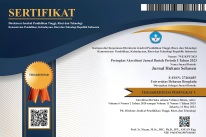How Is The Implementation Of Credit Restructuring Towards Consumers Of Leasing Finance Institutions
Abstract
Credit restructuring is an important instrument in the financing sector to anticipate non-performing loans that can harm both consumers and financing institutions. This study aims to analyze how credit restructuring is implemented for leasing consumers and the obstacles faced in its application. The research uses normative juridical methods combined with empirical approaches by reviewing relevant regulations and conducting interviews with related parties. The findings indicate that credit restructuring is implemented in several forms, including interest rate reduction, loan term extension, arrears reduction, and debt conversion. However, its implementation often faces obstacles such as limited communication, consumers' weak bargaining positions, and lack of understanding of their legal rights. This study emphasizes the importance of oversight from the Financial Services Authority (OJK) and the application of consumer protection principles so that restructuring truly benefits both parties.
Downloads
Copyright (c) 2025 Dwi Marthedi Putra, Erniwati Erniwati, Aidil Fitri

This work is licensed under a Creative Commons Attribution-ShareAlike 4.0 International License.






